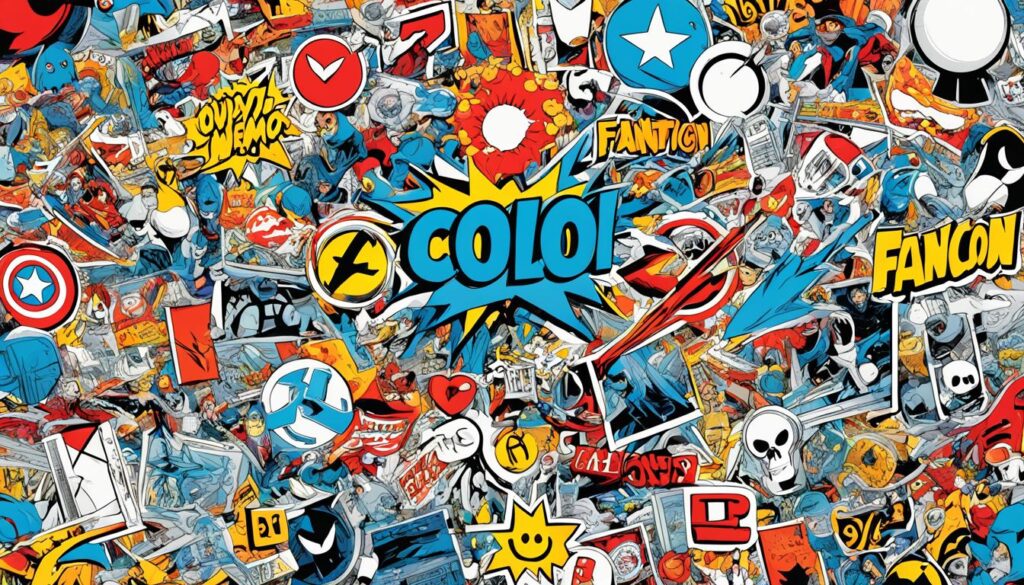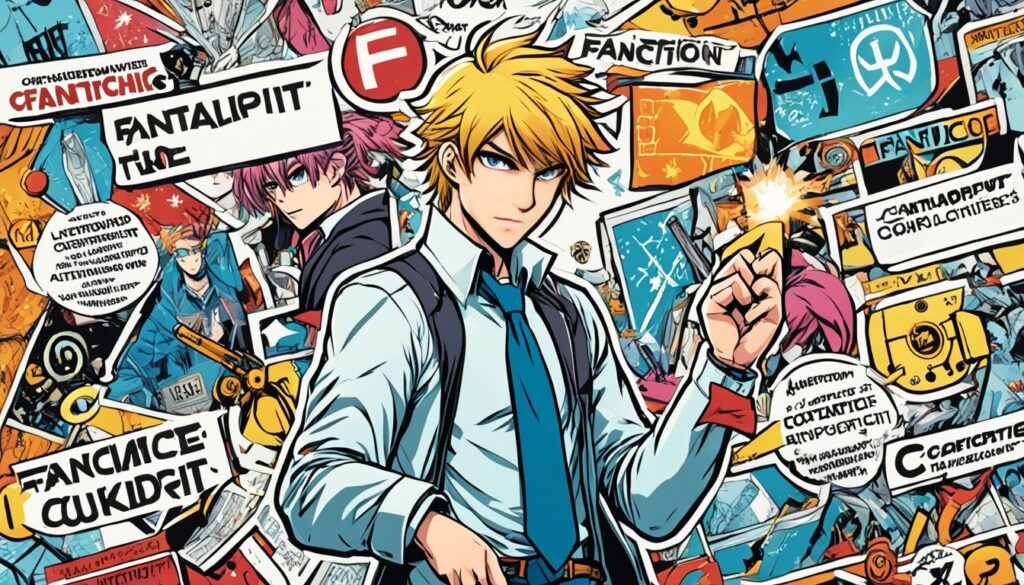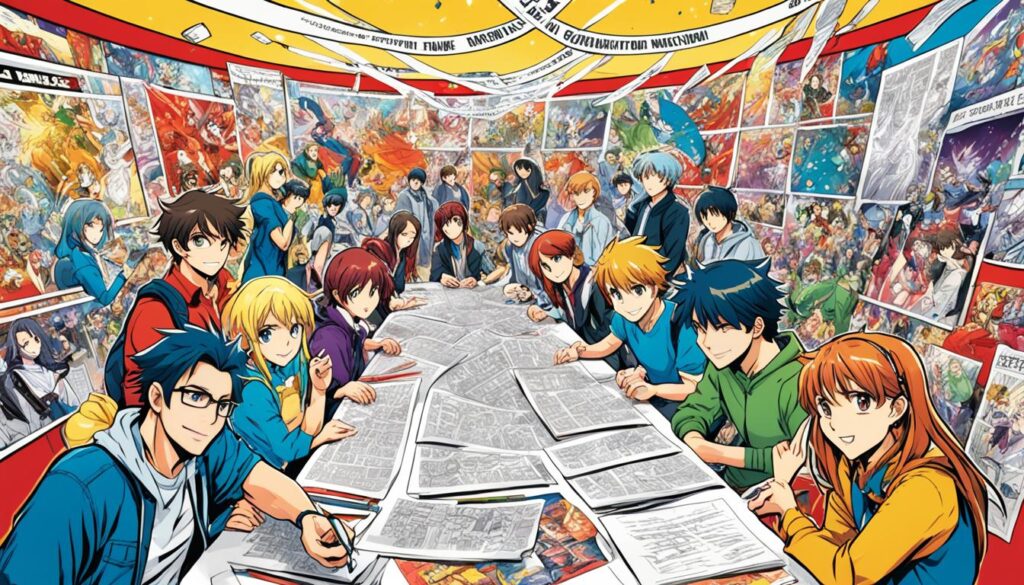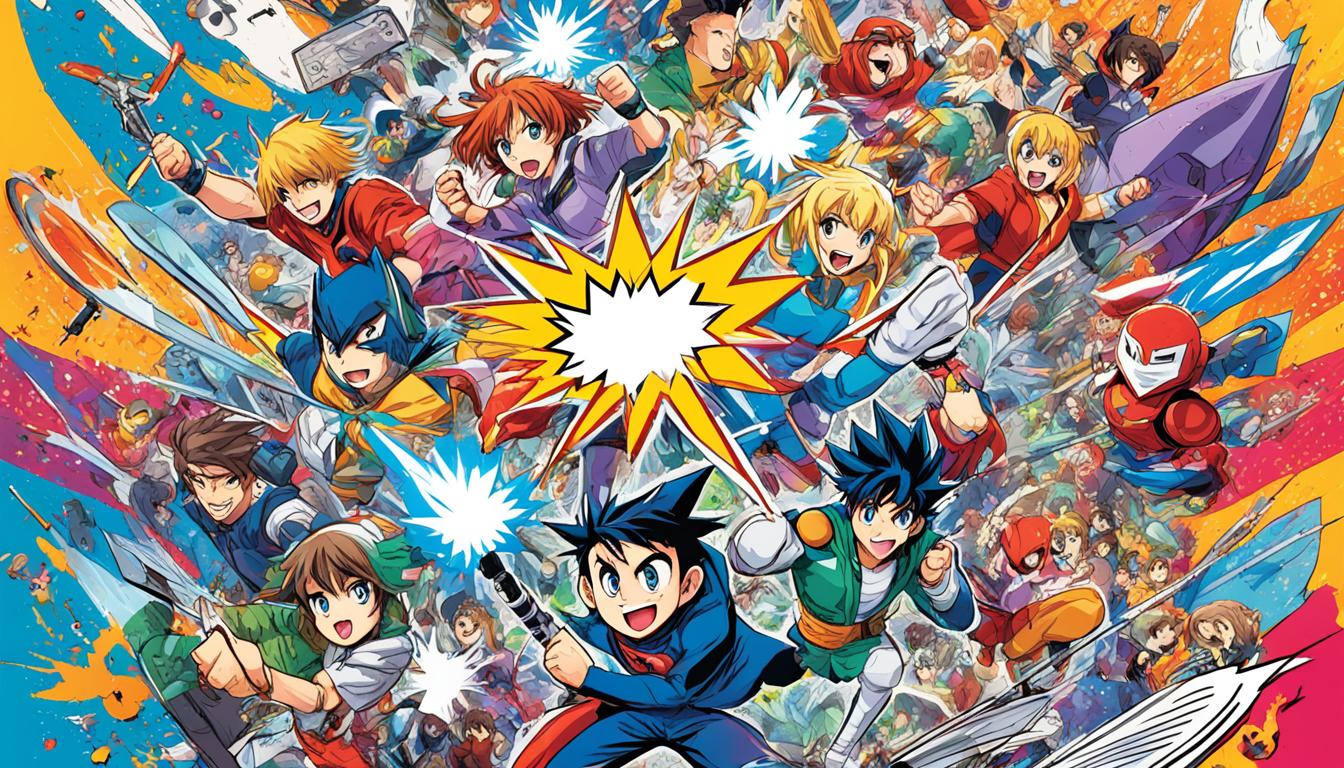Fanfiction is creating new stories with well-known characters and worlds. In the world, it’s huge. More than 60% of online writers make fanfiction. This shows how important it is to the creative scene. This article will introduce you to the fanfiction world, its roots, and its vibrant communities.
Readers will learn why people write fanfiction and what types of stories are out there. We’ll talk about making interesting characters and plots. We’ll cover the legal side and places that support fanfiction. We’ll also explore how fanfiction and are connected and how fanfiction can lead to creating entirely new stories. You’ll also get to know some famous fanfiction writers and their works. We’ll peek into the future of this creative writing form.
Key Takeaways
- Fanfiction is a thriving literary form that allows within established fictional universes.
- Writing fanfiction can serve as a valuable creative outlet and a means to alleviate writer’s block.
- Fanfiction communities foster a strong sense of belonging and collaboration among .
- Crafting fanfiction helps writers develop essential skills, including character development, dialogue, and prose writing.
- Successful authors have transitioned from fanfiction to creating their own original works.
What is Fanfiction?
Fanfiction is the act of creating stories with beloved characters and worlds from books, movies, and more. It started in the early 20th century, when fans began writing their own tales. Now, with the internet, fanfiction has become a global phenomenon. It lets fans everywhere share new adventures within their favorite stories.
Definition and Origins
Fanfiction is about writing new stories with existing elements. It lets fans of all kinds explore their favorite worlds more deeply. This tradition started in the early 1900s, empowering fans to add their own twists to the stories they adored.
Fanfiction Communities
Online communities have made fanfiction more popular than ever. Platforms like FanFiction.net and Archive of Our Own (AO3) are central. They allow authors to share their stories and connect with fellow enthusiasts. Here, writers can refine their skills, get advice, and discuss their favorite stories with others.
Why Write Fanfiction?
Writing fanfiction is a brilliant creative outlet for fans. They can dive into worlds and stories they love. By making their own tales, authors explore new ideas and bring characters to life.
They use their imagination freely and mix different writing styles. This way, they add their mark to the stories they cherish.
Creative Outlet
Fanfiction is a place for fans to show their creative pursuits. It lets them deepen the original stories with new backstories, characters, or twists. This way, they get to know the fictional worlds better.
Exploring Existing Worlds
By writing fanfiction, fans get to explore existing fictional worlds more. They build on the main stories, making them richer and more detailed. This is exciting for both writers and readers as they shape the stories together.

Fanfiction
Fanfiction is a type of story written by fans. It covers tales about popular shows, movies, and books, like anime and manga. By writing their own stories, fans show love for the original works and their favorite characters. They get to be creative and share their ideas with others. Fanfiction lets authors create new adventures for well-known characters, adding more depth to their worlds.
In recent years, fanfiction has become extremely popular. There are many websites where fans can post and read these stories. This easy sharing helps fanfiction flourish. It connects fans from all over, each bringing their unique ideas to the mix.
Fanfiction helps fans dive deeper into the worlds they love. They can imagine different paths for characters and explore fresh storylines. This shows how much people enjoy the original stories and how creative fans can be. Fanfiction is a big part of the community surrounding these works, adding new layers to the tales everyone knows.
Types of Fanfiction
One big type of fanfiction is called canon-compliant. This type sticks closely to the original story and characters. They often fill in gaps or add more details. This lets writers stay true to the story but also add their own ideas.
Alternate Universe (AU) fanfics are also very popular. In these, authors change the original story and settings completely. They create brand new worlds for the characters. This type lets writers explore different versions of the story, asking, “What if this happened instead?”
Crossover fanfiction brings together characters and stories from different sources. This means mixing things up from various worlds. It’s a way to see what happens when characters meet from different stories. Crossover fanfiction is all about trying new things and surprising readers with unique combinations.

Character Development in Fanfiction
Exceptional fanfiction shines with its deep and engaging characters. Authors dive into the souls of the characters. They explore emotions, psychological aspects, and relationships. This brings the characters to life in new ways, making the reader see them differently.
Character development in fanfiction is vital for keeping readers hooked. Authors must balance staying true to the original character while adding deeper layers. This helps readers feel more connected to the characters.
Skilled writers in fanfiction focus on the characters’ emotions and past. They reveal struggles and how relationships evolve. This approach increases the reader’s involvement and makes themes and conflicts more compelling.
It’s key for fanfiction writers to keep the characters’ unique traits. This includes how they talk and make decisions. Doing this well makes the story feel authentic and resonates with readers.
Character development in fanfiction is key to its success. It engages readers and shows off the community’s imagination and skills in storytelling.
Plot Structures in Fanfiction
Fanfiction stories often use traditional plot patterns to keep readers interested and drive the story ahead. The exposition is key. It brings together the setting, characters, and the main problem or struggle at the start. This part is important for getting readers up to speed with the world and for hooking them with new twists or viewpoints.
Rising Action
Diving into the rising action, the story starts picking up pace. Tensions rise, and the narrative becomes more intricate. Writers add layers to the struggle, show character growth, and throw in fresh challenges. They do this to keep readers glued to the story, eager for the big moment.
Climax
The climax is when everything comes to a head. The story’s main conflict hits its most intense peak. It’s the high point where characters must face their biggest trials. Writers carefully time the build-up to this moment, focusing on characters and deciding the story’s fate. They work hard to make these scenes compelling and memorable.

Writing Techniques for Fanfiction
Dialogue and Narration
Crafting engaging dialogue and effective narration are key for fanfiction writers. They should embody the original characters well. This means catching how they talk and what they say exactly.
Bringing in new dialogue that boosts the story and character growth is also important. The way a story is told and from whose view can really draw readers in or push them away. It can make all the difference in how connected readers feel with the characters and their journey.
Descriptive Writing
Detailed and vivid descriptions are the heart of great fanfiction. They help make the story come alive for the reader. Writers should turn the book’s or show’s places into ones people feel they’ve been to.
The skill lies in adding new details and locations that still feel true to the original. By painting a clear visual picture, writers can teleport readers into the story. This method makes it easier for readers to get emotionally involved and fully dive into the world you’re creating.
Fanfiction and Copyright Laws
The connection between fanfiction and copyright laws is touchy and often argued. Fanfiction usually stays in the gray area legally. Many works are not commercial, but they use copyrighted characters, worlds, and plots from original creators. Writers of fanfiction must be cautious. They need to make sure they are not violating the intellectual property rights of the work they are using.
In the United States, only works that are “original work of authorship fixed in any tangible medium of expression” get copyright protection. For works that were created in 1978 or later, protections last the author’s life plus 70 years. This means copyright holders have the only right to make and sell works based on their original work.
Fanfiction might be covered under fair use if it’s changed and not sold. But, what counts as fair use is not always easy to tell. Court decisions differ. For instance, in 2009, a court stopped a book that was too similar to The Catcher in the Rye. But, they allowed another book, The Wind Done Gone, which changes the story of Gone with the Wind significantly.
Trademarks also matter in the legal aspects of fanfiction. By the Lanham Act, a trademark is a name, logo, or slogan that shows where a product or service comes from. Trademarks don’t automatically get rights; they must show they are unique. To win a trademark case, the owner must show that consumers can confuse their brand with another, based on different factors.
Kristina Butke from In Your Write Mind says making new works based on copyrighted material without the owner’s okay is a copyright violation. Yet, “fair use” is tricky and varies, with courts ruling on whether a use is fair or not.
The legal aspects of fanfiction are ever-changing. Some authors like J.K. Rowling and Meg Cabot welcome fanfiction with conditions, but others like George R.R. Martin and Ann Rice are against it. Authors of fanfiction need to be careful. They should respect copyrights while sharing their own creativity.

Popular Fanfiction Platforms
FanFiction.Net is an old and famous site for fan fiction stories. It started in 1998. Since then, it’s been a main spot for people to share stories they’ve written about their favorite shows, movies, and books. It offers a wide variety of stories for both readers and writers to enjoy. People can read and write stories about many different things.
Archive of Our Own (AO3)
The Archive of Our Own (AO3) is a big site for fanfiction too. It started in 2008 by the Organization for Transformative Works. This site is well-known for being very supportive of all kinds of stories and people. It has an easy-to-use system and a big focus on making sure writers get credit for their work. AO3 is a place where everyone can find stories they love and share their own.
Fanfiction Communities and Events
The fanfiction world isn’t just online. It has strong groups and events in the real world too. Gatherings like conventions and meetups help writers, readers, and fans meet. They can swap stories, learn in workshops, and dive into the fun of fan-made tales.
These events are all about building a community. They help people share ideas and inspire each other. Plus, they let fanfiction writers shine and find friends with similar interests.
Conventions and Meetups
Conventions and meetups are key for fanfiction fans. Here, writers and readers can come together and show their love for their favorite stories. They get to share tales, get feedback, and be inspired by others like them.
In these events, you can join workshops or listen to talks. This helps everyone get better at writing fanfiction and feel closer as a community.
Online Forums and Groups
Besides fanfiction websites, there are many online groups and forums. Here, people talk about their beloved stories, give writing tips, and share what they’ve written. It’s a place where fans can support each other as they write.
In these online spots, writers find help to improve. They get useful feedback and even meet others to write together. It’s a great place for beginners and advanced writers alike.

Fanfiction and Original Fiction
Many fanfiction writers start their journey to original stories. The skills they get from writing fanfiction, like making characters and worlds, help a lot. Though, moving from fan stories to new works has challenges. They must avoid legal issues and be creative with their own ideas. Crafting fanfiction shows them the way to take these first steps into original fiction.
Transitioning from Fanfiction to Original Works
Moving from fanfiction to original fiction is hard but can be really good. Fans who’ve written stories using existing worlds know a lot about creating characters and settings. This can aid them greatly in making fresh tales. Yet, writers have to be careful about copyright and not lean too much on what inspired them.
Fanfiction writers turning to original fiction can use their smarts in storytelling and characters. The detailed work they put into fan stories lays a strong base. It helps them in becoming makers of completely new universes and stories.
Even with skills from fanfiction, making the switch isn’t easy. Authors may need to change how they write, focusing on brand-new content. It’s vital their stories make sense and are not just a redo of the original. The journey from fan works to their own creations needs a mix of old skills and new ideas.
Notable Fanfiction Authors and Works
Fanfiction authors have grown in popularity. Their stories resonate with fans. They have made a big impact in their fandoms. This section will introduce you to the world of fanfiction. You’ll see its value and influence in literature. We will look at notable authors and their influential works.
Many famous authors began in fanfiction, like Cassandra Clare and Marissa Meyer. Even Neil Gaiman wrote fanfiction about famous characters. Lev Grossman supports fanfiction and has written stories about “How to Train Your Dragon.”
Notable works have reached beyond fans. For example, Rainbow Rowell’s “Fangirl” became a popular series. Claudia Gray turned fanfiction into a successful book series. Anna Todd’s One Direction story was published and made into a movie.
Well-known authors began with fanfiction. Marjorie Liu began with X-Men fanfiction. Grossman, Hinton, Cabot, and others used their fanfiction skills in their books. They show how fanfiction can lead to original stories.

Authors have created many fanfics, from Harry Potter to Twilight. They entertained readers and changed literature. Their contributions show fanfiction’s power in the writing world.
The Future of Fanfiction
The future of fanfiction always excites us, even if it seems a bit uncertain. Digital platforms make sharing fan-created content easy. This, along with greater acceptance, leads to fanfiction growing and changing.
Tech improvements will shape the future of fanfiction greatly. New content platforms and tech like virtual and augmented reality could change how we create and enjoy fanfiction. Fanfiction authors may soon use interactive tales and multimedia that make stories more engaging.
New developments in legal reforms and acceptance show fanfiction is gaining respect. This could mean more challenges and opportunities for fanfiction writers. It might also encourage more teamwork with mainstream creative groups, leading to more visibility and even paid projects for fanfiction work.
Overall, the future of fanfiction is full of promises and surprises. Fans can expect new stories in new ways. Speculating on where fanfiction is headed helps us see its growing place in writing and creativity.
| Metric | Value |
|---|---|
| Annual New Stories on FanFiction.net | Over 14 million |
| Monthly Page-views on Archive of Our Own (December 2021) | 1.7 billion |
| Percentage of Fanfiction Stories in English on Popular Platforms | Only one-third |
| Additional Languages Represented on Fanfiction Platforms | 20+ |
The future of fanfiction looks bright and varied. Many things will influence it, from new technology to how the law treats it. The literary world is starting to give fanfiction the respect it deserves.
Conclusion
In the anime and manga world, fanfiction is now a big and lively part. We talked about what fanfiction is, where it comes from, and how people write it. This article covered everything from why people write fanfiction to the ways they do it. We also looked at the rules about using others’ work in your stories.
Moreover, we saw that there are large communities of fanfiction lovers. They use different websites to share their work and even create new stories from scratch. We met some famous fanfiction writers and looked at their impact. And we discussed what might happen in the future with this kind of storytelling.
Fanfiction is more important than ever in the anime and manga world. It gives fans a place to share their love for the characters and worlds they enjoy. This article wraps up everything we learned, giving you a full picture of fanfiction’s importance in these amazing universes.
FAQ
What is fanfiction?
Fanfiction is when fans create their own stories with beloved characters and settings from existing works. This can include stories from books, movies, TV shows, and even anime and manga.
What are the origins of fanfiction?
The start of fanfiction dates back to the early 20th century. Enthusiasts of literature began writing their own tales based on their favorite stories.
What are the main types of fanfiction?
There are a few key types. You have stories that stay true to the original, tales set in different worlds (AU), and stories that mix elements of different series.
How do fanfiction authors develop compelling characters?
They focus on what makes the characters tick. They dive into their feelings, thoughts, and relationships, making them more real and interesting.
What are the key plot structures used in fanfiction?
Often, writers use classic story elements. They start with the setting, build up to the main events, and then reach a turning point in the story. This keeps readers hooked.
What are the legal considerations surrounding fanfiction?
Being legal is tricky for fanfiction because of copyright. Authors need to be careful to avoid using others’ exclusive rights without permission.
What are some of the popular fanfiction platforms?
Platforms like FanFiction.Net and Archive of Our Own (AO3) are big places for fans to read and write. They support the community with features for sharing and discussing stories.
How do fanfiction communities and events contribute to the genre?
Communities online and offline offer writers a place to grow and interact. There, they get feedback and share ideas. Events like meetups and conventions are key in keeping the genre alive and thriving.
Can writing fanfiction lead to original fiction?
Yes, fanfiction can be a starting point for creating new stories. The skills you learn in fanfiction writing, like world-building and developing characters, can be helpful in making your own unique stories.
What is the future of fanfiction?
The future is both exciting and unknown. Changes in technology and laws, along with greater acceptance, will define where fanfiction goes next.
Source Links
- https://bloomreviewsblog.com/2018/06/04/waxing-philosophical-the-benefits-of-writing-fanfiction/
- https://www.deviantart.com/fanfiction-authors/gallery/26301577/anime-manga
- https://m.webnovel.com/stories/fanfic-anime-comics
- https://www.wikipedia.org/wiki/Fan_fiction
- https://nhfpl.org/what-is-fanfiction/
- https://notesfromthemetro.com/pros-and-cons-of-writing-fanfiction/
- https://itsnotjustfiction.wordpress.com/2022/01/23/why-reading-and-writing-fanfiction-is-an-excellent-way-to-grow-as-a-writer/
- https://www.paytonhayes.com/blog/why-fanfiction-is-great-writing-practice-and-how-it-can-teach-writers-to-write-well
- https://www.fansplaining.com/articles/fan-fiction-vs-fanfiction
- https://en.wikipedia.org/wiki/Fan_fiction
- https://medium.com/@ysgomez/from-the-fluff-to-the-angst-the-most-popular-fanfiction-genres-270379d2559
- https://library.pfw.edu/c.php?g=16316&p=89238
- https://www.wattpad.com/583676438-how-to-write-fanfiction-writing-a-character-arc
- https://writewithharte.com/from-fanfiction-to-author-how-writing-fan-fic-elevates-your-writing-game/
- https://www.wattpad.com/125248756-how-to-write-fanfiction-plotting
- https://www.wattpad.com/305270319-so-you-want-to-write-fanfiction-story-structure
- https://blog.nanowrimo.org/post/675023249585946624/writing-fanfiction-tips-for-avoiding-common
- https://www.deviantart.com/animedemon001/art/A-Beginners-guide-to-writing-fanfiction-454700419
- https://www.tumblr.com/ao3commentoftheday/635087794540347392/50-tips-for-fanfic-writing
- https://en.wikipedia.org/wiki/Legal_issues_with_fan_fiction
- https://www.oif.ala.org/copyright-and-fanfiction-a-primer/
- https://medium.com/@joannasmith008/fanfiction-428029544a12
- https://brandeishoot.com/2023/02/17/an-official-ranking-of-the-most-popular-fanfiction-websites/
- https://epubor.com/best-fanfiction-sites-of-all-time.html
- https://tsl.news/opinion-embracing-y-n-the-merits-of-fanfiction-and-fan-culture/
- https://our.utah.edu/spur/understanding-how-stories-evolve-in-fanfiction-communities-via-data-science/
- https://depts.washington.edu/hdsl/2022/10/29/four-benefits-to-participating-in-fanfiction-events-regina-cheng/
- https://bothersomewords.com/2014/03/31/on-writing-skills-professional-writing-versus-fanfiction/
- https://www.tumblr.com/howtofightwrite/662265633882488832/the-butterfly-effect-pitfalls-of-converting-your-fanfict
- https://duckprintspress.com/2021/10/24/transitioning-from-writing-fanfiction-to-writing-original-fiction/
- https://lplks.org/blogs/post/21-published-authors-who-write-fanfiction/
- https://www.vulture.com/2015/03/6-famous-authors-whove-written-fanfiction.html
- https://kianatjerrell.medium.com/is-fanfiction-the-future-form-of-writing-e1e010c0fc53
- https://italicsmine.com/2023/01/20/what-does-fanfiction-mean-for-the-future-of-writing/
- https://www.wattpad.com/533820571-the-guide-book-on-writing-fanfiction-creating-a
- https://www.fcpgh.org/part-6-history-of-fan-fiction-conclusion/
